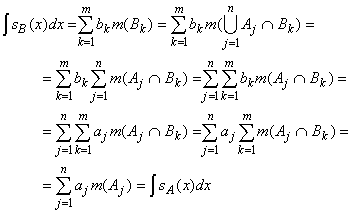7.4. Lebesgue Integral
Example 7.4.4(e): Lebesgue Integral for Simple Functions
We have seen before that the representation of a simple function is
not unique. Show that the Lebesgue integral of a simple function is independent
of its representation.
We have to show that if s is a simple function with two
different representations, then the integrals using either representation
agree.
First assume that there are two representations for s
sA(x) =such that sA(x) = sB(x). Let's assume that the integral of s using the first representation exists, i.e. the measure of all sets Aj is finite.aj XAj(x) with Aj disjoint and aj not zero
sB(x) =bk XBk(x) with Bk disjoint and bk not zero
If x  Bk
then x must be contained in one of the Aj's
because otherwise sB(x) # 0 and sA(x) = 0.
Therefore
Bk
Bk
then x must be contained in one of the Aj's
because otherwise sB(x) # 0 and sA(x) = 0.
Therefore
Bk

 Aj so
that m(Bk) is finite for all
k so that sB is integrable.
Aj so
that m(Bk) is finite for all
k so that sB is integrable.
By the same reasoning we have
Bk =If Ajj ( Aj
Bk ) and Aj =
k ( Bk
Aj )
 Bk
is not empty, then for
x
Bk
is not empty, then for
x  Aj
Aj
 Bk
we have
Bk
we have
aj = sA(x) = sB(x) = bkso that aj = bk in that case. Putting everything together gives:
so that the integrals agree regardless of the representation.
It remains to show that the integral of a simple function agrees with the integral over the canonical representation of that function, i.e. when the sets are disjoint and the coefficients are not zero.
 Interactive Real Analysis
Interactive Real Analysis